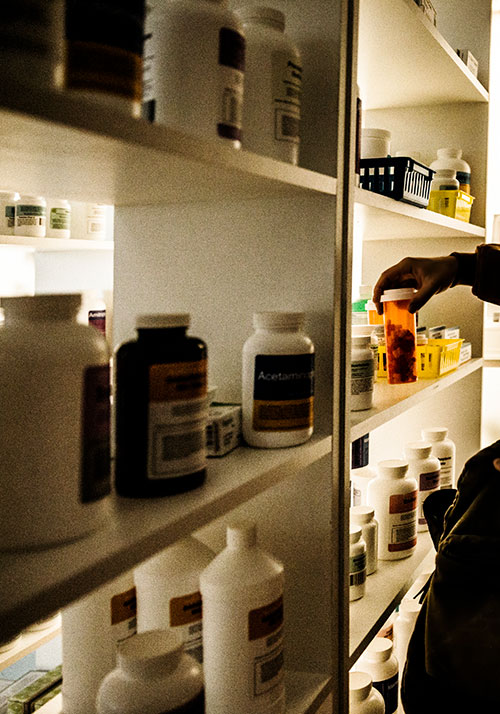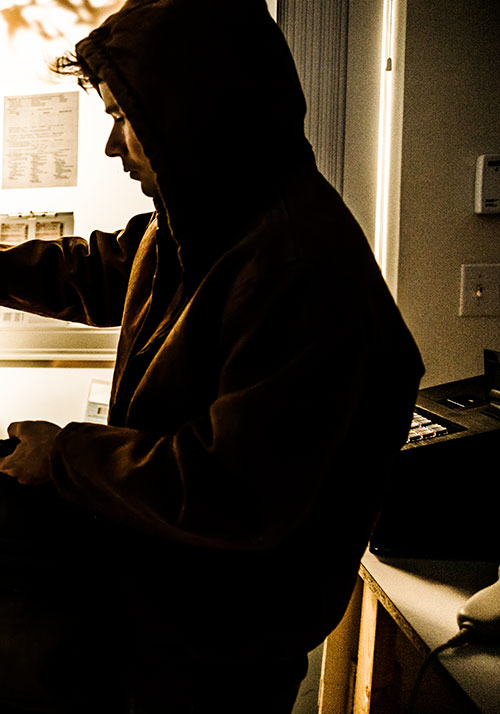Addiction-Related Fraud
Spotting The Signs And Successfully Confronting Your Loved One
One of the scariest things about addiction is that it can make a person do things they never thought they would — and for some, that means committing fraud. Some people in the throes of substance abuse become so desperate to satisfy their intense cravings and avoid withdrawal that they steal money, credit cards, or even someone’s identity to fund their habit. It’s devastating to think an addicted loved one could commit such a heinous crime, especially if you are the victim. An addiction issue is by no means justification for committing such acts, but understanding how someone can be driven to that extreme is an important factor in addressing the issue.



This guide will give you insight into what role addiction might be playing in fraud committed by an addicted loved one, help you recognize the red flags, and discuss options for resolution. It’s completely natural to feel angry or hurt if your suspicions are confirmed, and the decision to take legal action is yours alone to make, but understanding the entire picture can have an important effect on both your own healing process and your loved one’s.
Addiction and Fraud: What’s the Link?
A 2007 study from the Department of Justice found a significant relationship between methamphetamine addiction and identity theft. Reporting from law enforcement indicated that many drug trafficking organizations made fraud an integral part of their business model: leaders would seek out meth addicts and offer them drugs (or money to buy drugs) in exchange for stolen mail, credit cards, or legal documentation. Then, the ring leader would turn around and open a bank account, write and cash fraudulent checks, purchase materials to make drugs, or open a credit card under another’s name. By creating a regular rotation and constant influx of new victims, they were often able to evade legal consequences for long periods of time before ever getting caught.

While there’s a lack of investigation on this subject within the last decade, this research still offers valuable insight. Some addicts become so entrenched in their habits that they’re unable to maintain a job or generate any kind of income. In addition to this putting a strain on their living finances, it can also make it increasingly difficult to find money for drugs. The trafficking leaders understand that an addict in need of a fix may do just about anything to avoid painful withdrawal, even breaking into others’ property to steal personal documents.
But addiction-related fraud doesn’t have to be as organized or large-scale as doing dirty work for a drug trafficking ring. An addict may seek out this opportunity on their own, especially if they’re hanging out in rough neighborhoods where crime is so commonplace that it’s easy to get away with. They also might stumble across an opportunity — a dropped wallet, unlocked door, or briefly-unmonitored checkbook, for example — and feel too overwhelmed at the thought of losing their high to make the right choice. Some may even steal directly from friends or family, whether it’s cash, credit cards, checks, or social security numbers. Again, there is certainly no excusing these actions, but it’s relevant to note that the motivation is often solely drug-related; it might not even occur to the addict just how personal and intentional their theft will feel to their victim. It’s a cruel harm to inflict on another, especially a loved one, but substance abuse often blurs the lines of morality.
It’s also important to consider that reckless, impulsive behavior is a direct side effect of addiction, and ultimately a major part of the recovery process. Even if an addict is aware their habit has spun out of control, they’re often so overcome by their dependency on their drug of choice that they no longer have the capacity to say no — even if their only option for funding it is fraud. Some may even use fraud as a way to keep their substance abuse hidden: they might be worried a spouse will notice unexplained bank withdrawals or money missing, so instead they use money that isn’t theirs to spend.
The fact is, addiction is powerful. It inhibits a person’s ability to make healthy choices, to come clean about their problem, and to dig deep for the inner strength to overcome it. On top of the mental consequences, it often causes a user to feel physical dependence on the drug. Their body may become so accustomed to the constant high or stimulation that it no longer functions correctly without it, sometimes physically revolting if a craving isn’t satisfied. Fever, chills, shaking, and vomiting are just a few of the painful symptoms a person might experience, and when combined with their mind telling them they need the drug, it can be overwhelming. They may convince themselves that if others only knew the pain they feel, they’d understand the betrayal of fraud. Some addicts may even be so afraid others will discover their substance abuse that stealing seems more desirable than getting caught.

The reasons an addict may commit fraud will vary from person to person. If you discover it’s been an issue with your loved one, it will be difficult to hear them out, but you must try. Their excuse may not satisfy you, and it doesn’t mean you shouldn’t hold them accountable for their actions, but your relationship likely warrants at least trying to understand.
Spotting and Addressing Fraud: What To Look For, and How To Proceed
You’ll want to make sure you have plenty of valid evidence that your loved one is in fact committing fraud before confronting them. It may be helpful to confer with others about your observations, but do your best to keep it a closed circle. These topics can quickly escalate into petty gossip even if your intentions begin as pure, and you don’t want to make your loved one feel ganged up on or that their privacy has been violated — especially if your suspicions turn out to be incorrect.
The signs of fraud aren’t always obvious, and sometimes it’s the people closest to the addict that have the most trouble seeing the truth, even if it’s your own family they’re stealing from. Much of it will entail taking a more detailed look at your finances and paying closer attention to your mail, personal documents, cash, checkbook, and credit cards. Some fraud warning signs to keep an eye out for include:
Unexplained bank withdrawals, new accounts, or new credit cards
Becoming overdrawn on your account(s) unexpectedly
Calls from debt collectors about debts that aren’t yours
Missing cash from your wallet or other emergency supplies
Missing checks, especially in conjunction with skipped entries in your register
Large piles of mail kept in strange places (in the car, tucked into a clothing drawer, or anywhere else that seems out of place)
And it isn’t just your bank billing you should take a look at. With the country currently facing a dangerous opioid epidemic, medical fraud can be a serious issue for an addict looking for painkillers. You might notice unexplained medical claims, incorrect conditions listed on your or your partner’s records, or insurance billing for medication you didn’t receive. Some opioid addicts “doctor shop,” meaning they go from physician to physician to receive new prescriptions. Keep a close eye not only on what you’re being billed for, but for who is billing you. Call and speak with a representative if you see any discrepancies before talking to your loved one — clerical errors sometimes happen, so it’s crucial to double-check that the insurance company or billing doctor didn’t make a mistake.
If your loved one is committing fraud against someone else, it can be even more difficult to tell for certain. You may have to depend more on behavioral cues and personal observations that something is amiss, including:
Sudden, unexplained increases in spending (especially if they’re unemployed)
Secretive behavior regarding finances
Using major credit cards you’ve never seen them with before
Disappearing for extended periods during group gatherings, especially at someone’s home
Pieces or piles of mail with others’ names (keep in mind it could have been a postal error your loved one intended to correct)

It’s often the combination of several factors that ultimately leads to the discovery of fraud, but it could be as simple as one major piece of evidence. Whatever the case, you’ll want to provide your loved one ample proof of their actions when confronting them. Be prepared that they most likely won’t admit to anything right away, even if the proof is overwhelming. They may insist you gave them permission to “borrow” cash or swear they had every intention of paying you back. Some will attempt to use guilt, saying they’d lend you money if you were in trouble and they assumed you’d do the same. Others will manipulate past conversations to make it seem like they had a sincere reason to believe they weren’t wrong for taking the money. And some will simply deny everything no matter what you say.
It’s important to go into the conversation prepared for these kinds of rebuttals, and to maintain your patience no matter what your loved one says. If your loved one is also in denial of their addiction problem, the situation can be even more heated, so make sure you have plenty of evidence to support that claim as well. Stay steadfast and consistent, and try to avoid judgment.
It’s perfectly OK if you feel angry, and you’re certainly allowed to tell your loved one how you feel, but let them know you also truly want to understand. Tell them that this behavior doesn’t seem like something they’d do, and that’s part of why you’re so frustrated. Remind them that you love them, want the best for them, and worry they’re on an incredibly dangerous path. Make sure your loved one knows that your intention is to help them, but first you have to understand exactly what’s going on. Do your best to be receptive, especially if they begin to open up. Though it will be difficult, it’s best to put your emotions aside as much as possible during this conversation so they don’t shut down. They might even ultimately feel relieved that they no longer have to hide everything, and knowing that you will be there to help them resolve the problems — that they don’t have to face them alone — can make a significant difference in how honest they are with you.

The best option for your loved one is to seek professional addiction treatment. If it’s a spouse or partner, you might want to do some research on programs and centers ahead of time. Let them know you’ve found some options, but don’t force them to look or bring a representative from the center until you’ve had a private conversation first. Your loved one might not agree to treatment right away, so give them some time to think about it. Leave the information for them to look at whenever they’re ready, perhaps even leaving them a phone number so they can speak to counselors at the center themselves. Revisit the conversation within a few days, and be persistent if they still refuse. Note that addiction is a disease and not something anyone can handle completely on their own, and that asking for help isn’t a sign of weakness, but truly a sign of strength — we all have our limits, and recognizing them is an important sign of growth.

A crucial part of any addiction treatment is coming to terms with past mistakes, so your loved one should be prepared to talk about their fraudulent actions as part of their therapy. Don’t bring up the subject before they enter treatment, but if you participate in their counseling sessions, you should bring it up for productive, guided discussion. Since you’ll have a trained counselor to help navigate such a painful topic, let this be the time you allow yourself to show your emotions. But try not to let them get the best of you, and remember that any words spoken in anger can’t be taken back. Their time in treatment is a time to heal, and honesty is key, but mending the fence once they are sober can be even more difficult if you’re not mindful of your words.
Overcoming the betrayal of an addicted loved one committing fraud is a process. Everyone involved will need time, honesty, and compassion in order to move forward. If you decide to pursue legal action against your loved one, consider letting them know ahead of time instead of having them served with papers unexpectedly. Explain your thought process and ask them to understand, recognizing that it may be difficult for them at first. Your loved one may initially lash out, perhaps emitting their share of angry words. Do what’s right for you, and ponder the idea of taking some space while the legal details are handled. It’s quite possible they’ll understand once they’ve got several months of sobriety under their belt, but until then, the best thing very well may be time and space. You might even realize it’s you who needs the space in the meantime.
Be kind to yourself as you heal, and don’t be afraid to seek your own counseling. The betrayal of addiction-related fraud is often the most difficult aspect to overcome, and a therapist can be integral to sorting out your feelings. In time, you, your family, and your loved one can and will heal.

